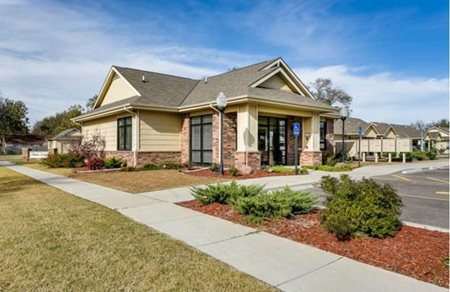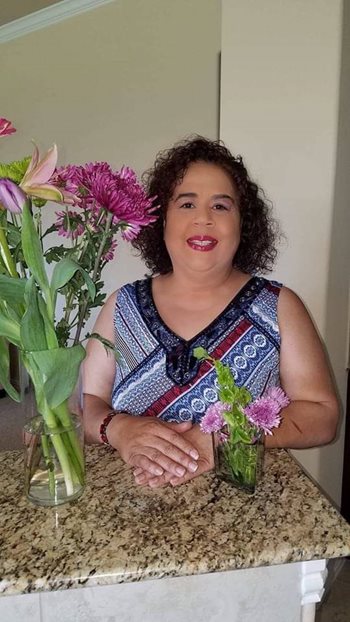The letter was written by hand on lined paper. On those lines – and between them – was gratitude from a tenant trying to rebuild her life after an abusive marriage. She had come to the transitional townhomes at Mennonite Housing Rehabilitation Services, Inc., in Kansas with her three children. But the progress she had made in rebuilding her life seemed to come to a halt when COVID-19 took away her employment.
 She fell behind on her rent in late summer and early fall. Mennonite Housing paid her back rent through a fund the organization had created for residents. A grant from NeighborWorks America's Rental Resilience Fund helped. The fund received a generous contribution from the Wells Fargo Foundation, which set a goal early on to keep people safe and housed during the pandemic. The resilience fund dispersed more than $10.2 million to NeighborWorks network organizations to help with rent for people like the woman at Mennonite Housing.
She fell behind on her rent in late summer and early fall. Mennonite Housing paid her back rent through a fund the organization had created for residents. A grant from NeighborWorks America's Rental Resilience Fund helped. The fund received a generous contribution from the Wells Fargo Foundation, which set a goal early on to keep people safe and housed during the pandemic. The resilience fund dispersed more than $10.2 million to NeighborWorks network organizations to help with rent for people like the woman at Mennonite Housing.
As she read a notice from the housing organization, letting her know that the back rent would be paid, tears streamed down her face, the woman wrote. "The looming 'weight' was lifted off of my shoulders and I let out a sigh of relief. Writing this is the only way that I am able to express my gratitude. … Thank you for choosing my family."
Gratitude came from other residents, too, says Kathryn DeBoer, controller at Mennonite Housing. "We've helped 35 of our tenants over eight different properties catch up or pay current rent." The grant from NeighborWorks, with help from Wells Fargo, made a difference. The organization is saving part of the money to aid residents after they go through funding available from the state of Kansas.
Mennonite Housing has 904 apartment homes in its portfolio, covering 23 properties. Older residents who are on fixed income have not needed much help. But family properties, and properties that house women in transition, many of whom are fleeing domestic violence, did need rental help, DeBoer says. They lost jobs or lost hours of work due to COVID-19. Some were sick and had to quarantine, losing more hours. "These are your frontline workers," DeBoer says of the people who live at Mennonite Housing. "These are the people who work at the grocery store, who work minimum-wage jobs and can't work from home. These are people who are underserved."
DeBoer says that as frontline workers, they need and deserve extra help. DeBoer provided properties with cleaning supplies and a variety of personal protective equipment for management to use when needed. Mennonite Housing has given older adults access to laptops, through service coordinators, so they can get health care remotely. The organization's bus driver helps with the shopping. "We're doing what we can to help our tenants stay healthy," DeBoer says.
So far, there have been no outbreaks of the virus at any of the properties, and the residents 65 and older are beginning to get their vaccines. That's helping. DeBoer says that rental assistance is also helping residents feel more secure as they begin to recover from the economic effects of COVID-19.
Tommy Benford has been with Mennonite Housing for 13 years, managing three properties that were built in some of the most distressed areas of Wichita. His background is in social work and counseling, he says, and he's in close contact with residents in the 136 units he manages.
His philosophy has been, "It's not where you live, it's how you live." His job, he says, is to keep residents in their apartments, not to find reasons to kick them out. That's especially true during COVID-19, when so many residents have been impacted economically, sometimes interfering with their ability to pay rent.
Benford says all of his residents have been able to stay in their apartments during COVID, though some have gotten help through other resources and through NeighborWorks and the Wells Fargo Foundation, which helped fill in the gaps.
 That was funding that Mennonite Housing used to help Janice McKinzie, who had been a gig worker with Uber, Lyft and DoorDash. When someone needed her services, she would drive through the streets of Wichita to get them where they needed to go.
That was funding that Mennonite Housing used to help Janice McKinzie, who had been a gig worker with Uber, Lyft and DoorDash. When someone needed her services, she would drive through the streets of Wichita to get them where they needed to go.
But when COVID-19 hit her community, her job didn't feel safe. "I have horror stories," she says. It was already impossible to keep six feet away from passengers, but some of them wouldn't wear mask in her car. They're argue with her. "The cherry on top was when they wanted to sit up front and I said they couldn't. They'd get mad," she says.
Already dealing with underlying medical conditions, McKinzie decided that it was time to stop putting herself at physical risk. But when she did that, other risks followed. For a time, she was able to receive unemployment via Pandemic Unemployment Assistance. That stopped in December, she says.
While some people live paycheck to paycheck, McKinzie says she'd been living bill by bill. "If I had a water bill that needed to be paid, I'd work as much as I needed, and then $50 extra," she says. "If I had a car payment that needed to be paid, I'd work off the car payment. That's how I faced it."
Without her income, she got behind on rent and other bills. Her car was repossessed. But Mennonite Housing was able to help, again using the Rental Resilience Fund grant to stretch resources to help residents. "There are challenges," McKinzie says. "But I have a safe place. I have food. If I had things my way, wish that none of this would have happened. But here we are."
McKinzie says many of her fellow gig workers also stopped work because of COVID-19. "I know things would have turned out a whole lot different for me and other residents if we hadn't been able to get this assistance," she says. "I'm grateful. … All you have to do is like the bible says: Love your neighbor as you would yourself and we'd all be in a better situation.'"
COVID-19 has had a tremendous impact on the people living in the properties Benford manages. "I would say about 25% of the population at each property was impacted," he says. "These resources made a tremendous difference. They allowed us to keep all of our residents in place, in their homes."
A year into the pandemic, he sees all of the stress on families who have had kids at home, and on staff as well. Whereas many businesses in town were able to have staff work from home, he says, Mennonite Housing staff members have continued to work onsite. They were able to see those who needed help.
Benford says many of the residents who received rental assistance hadn't known the help was there. "When they were able to receive it, it touched them in an emotional way," he says. "Many didn't know how they'd survive this experience of COVID. As more information became available, they became more hopeful and knew they wouldn't fall through a hole – someone would be there to catch them."
04/07/2021

